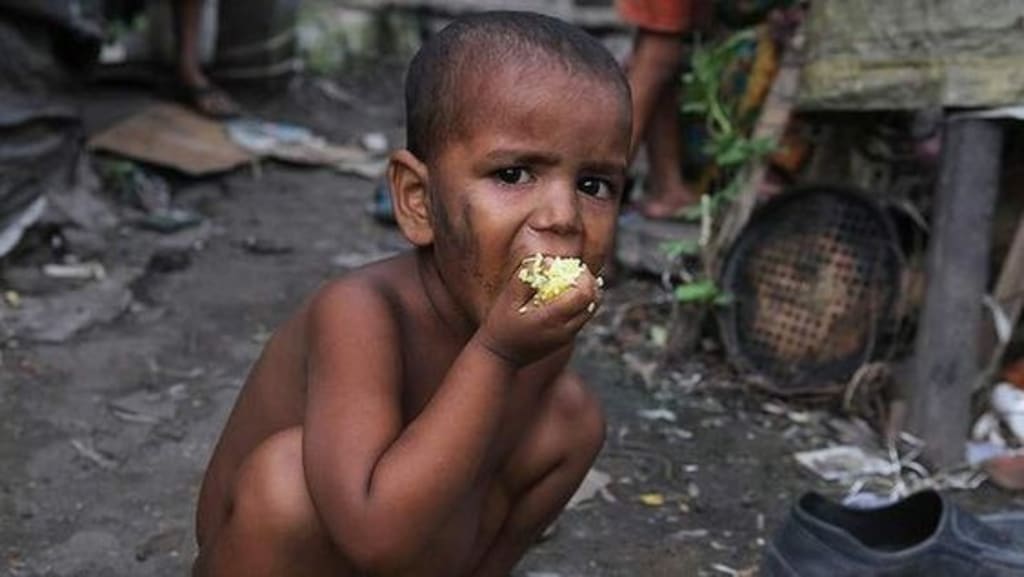
Hunger is a pervasive problem that plagues millions of people worldwide. It is a phenomenon that is most visible among the poor, who often lack the resources to access adequate food and nutrition. In many parts of the world, hunger is not just a physical condition, but also an emotional and psychological one. The hunger of the poor is a multifaceted problem that demands urgent attention from policymakers, philanthropists, and society at large.
Hunger is a complex issue that has many causes, including poverty, conflict, climate change, and economic inequality. In many parts of the world, hunger is a symptom of wider social and economic problems that need to be addressed to combat the root causes of hunger. For example, in conflict zones such as Syria and Yemen, hunger is a direct result of the destruction of infrastructure, the displacement of people, and the breakdown of food systems. In other parts of the world, such as sub-Saharan Africa, hunger is often caused by drought, poor soil fertility, and inadequate access to markets and credit.
Regardless of its cause, hunger has devastating consequences for those who suffer from it. Hunger can lead to malnutrition, which can cause stunting, wasting, and other health problems. Malnourished children are more likely to get sick, and their ability to learn and develop is severely compromised. Hunger also has psychological consequences, such as anxiety, depression, and feelings of hopelessness. The hunger of the poor is not just a physical condition; it is a condition that affects every aspect of their lives.
The hunger of the poor is not just an abstract problem; it is a problem that affects real people every day. In many parts of the world, families have to make difficult choices about how to allocate their resources. Should they spend their limited income on food, or should they spend it on other necessities, such as housing, healthcare, or education? For many families, the answer is not clear-cut. They have to balance their immediate needs with their long-term goals, and often have to make sacrifices that can have long-lasting consequences.
In many parts of the world, the hunger of the poor is most acute among women and children. Women often bear the burden of feeding their families, and are more likely to experience hunger and malnutrition than men. Children are also vulnerable to hunger, and are more likely to suffer from the long-term consequences of malnutrition. Hunger can have lifelong consequences for children, affecting their physical and cognitive development, and limiting their opportunities for the future.
The hunger of the poor is not just a problem that affects developing countries; it is a problem that affects communities in developed countries as well. In the United States, for example, one in eight people struggle with hunger, including 12 million children. The hunger of the poor in the United States is often hidden, but it is no less real. Families have to rely on food banks, government assistance, and other forms of charity to access adequate nutrition.
The hunger of the poor is a problem that demands urgent attention from policymakers, philanthropists, and society at large. many steps can be taken to combat hunger, including investing in agriculture, improving access to markets and credit, and providing social safety nets for vulnerable populations. In addition, many grassroots organizations are working to address the root causes of hunger, such as poverty, conflict, and economic inequality. These organizations provide vital support to communities in need, and can be a lifeline for those who are struggling to access adequate nutrition.
Ultimately, the hunger of the poor is not just a problem that affects the poor; it is a problem that affects us all. Hunger is a symptom of wider social and economic problems, and addressing it requires a comprehensive approach that addresses the root causes of poverty, conflict, and economic inequality. In addition to its physical and emotional toll on individuals and communities, hunger has broader economic and social implications. Hunger can lead to reduced productivity, increased healthcare costs, and diminished economic growth. It can also exacerbate social inequality, as those who are already disadvantaged are more likely to suffer from hunger and its consequences.
One of the main challenges in addressing the hunger of the poor is that it is often a symptom of larger structural problems, such as poverty and inequality. Addressing these problems requires a long-term commitment to social and economic development, as well as the political will to implement policies that promote equity and justice. In many cases, this requires challenging entrenched power structures and confronting vested interests that benefit from the status quo. It also requires addressing systemic issues such as land tenure, access to credit and markets, and political representation.
At the same time,many short-term interventions that can help to alleviate the suffering caused by hunger. These interventions include food aid, cash transfers, and nutritional support. Food aid can help to meet the immediate needs of vulnerable populations, while cash transfers can provide families with the resources they need to purchase food and other necessities. Nutritional support, such as micronutrient supplements and therapeutic foods, can help to address the long-term consequences of malnutrition.
Another key approach to addressing the hunger of the poor is to invest in agriculture and food systems. This includes supporting smallholder farmers, promoting sustainable agriculture practices, and improving access to markets and credit. By investing in agriculture and food systems, we can help to create more resilient communities that are better able to withstand shocks such as drought, conflict, and economic downturns.
Finally, addressing the hunger of the poor requires a commitment to social justice and equity. This means confronting systemic racism, gender discrimination, and other forms of social inequality that contribute to hunger and poverty. It also means empowering communities to take ownership of their own development, and ensuring that their voices are heard in the decisions that affect their lives.
In conclusion, the hunger of the poor is a multifaceted problem that demands urgent attention from policymakers, philanthropists, and society at large. It is not just a physical condition, but also an emotional and psychological one that affects every aspect of people's lives. Addressing the hunger of the poor requires a comprehensive approach that addresses the root causes of poverty, conflict, and economic inequality. It requires a commitment to social justice and equity, as well as short-term interventions that can help to alleviate the suffering caused by hunger. Ultimately, addressing the hunger of the poor is not just a moral imperative; it is also a necessary step toward building a more just and equitable world.
We cannot afford to ignore the hunger of the poor. It is a stark reminder of the inequities that continue to plague our world, and a call to action for all of us to do our part in creating a more just and equitable society.
As individuals, we can support organizations that are working to address the root causes of hunger and poverty. We can also raise awareness about the issue by sharing information and engaging in conversations with our friends, family, and colleagues. We can vote for politicians who prioritize social and economic justice, and hold them accountable for their actions.
As a society, we must recognize that hunger is not just an individual problem, but a systemic one. It is a symptom of larger structural problems that require collective action to address. We must confront the systemic inequalities that perpetuate poverty and hunger, and work to create a more just and equitable society.
In the end, the hunger of the poor is a call to action for all of us. It is a reminder that we are all connected, and that our actions – or inaction – have real consequences for the lives of others. We must respond to this call with urgency and compassion, and work together to create a world in which no one goes hungry.
Ultimately, the hunger of the poor is not just a problem that affects the poor. It affects all of us, as it undermines the stability and prosperity of our communities and our world. When people are hungry, they cannot reach their full potential, and their contributions to society are diminished. Hunger also increases the risk of conflict and instability, as people are more likely to resort to violence and crime to survive.
On the other hand, addressing the hunger of the poor can have a transformative impact on society as a whole. When people are well-fed and nourished, they are more productive, healthy, and able to contribute to their communities. Investing in agriculture and food systems can create jobs, stimulate economic growth, and increase food security. It can also promote environmental sustainability, as sustainable agriculture practices help to conserve natural resources and mitigate the impacts of climate change.
In addition, addressing the hunger of the poor can have a positive impact on social justice and equity. When we work to ensure that everyone has access to nutritious food and clean water, we are also addressing broader issues of social inequality and injustice. By empowering communities to take ownership of their development, we can help to create a more participatory and democratic society in which everyone has a voice.
In the end, addressing the hunger of the poor requires a collective effort from all of us. It requires political will, social commitment, and individual action. We must work together to create a world in which everyone has access to nutritious food, clean water, and other necessities of life. Only then can we build a truly just and equitable society, in which every person can thrive and reach their full potential?
There are many ways that we can all contribute to addressing the hunger of the poor. As individuals, we can donate to organizations that work to alleviate hunger and poverty, volunteer our time and skills to support these organizations, and advocate for policies that promote social and economic justice. We can also make conscious choices about the food we eat and the products we buy, choosing options that are more sustainable and equitable.
As businesses, we can adopt more sustainable and ethical practices, such as fair trade sourcing, reducing food waste, and supporting smallholder farmers. We can also invest in communities where hunger and poverty are most acute, supporting local food systems and creating jobs and economic opportunities.
As governments, we can prioritize policies that address the root causes of hunger and poverty, such as investing in social safety nets, improving access to education and healthcare, and promoting sustainable agriculture and food systems. We can also work to create a more just and equitable society, by confronting systemic inequalities and empowering marginalized communities.
Addressing the hunger of the poor is not an easy task, and there are no easy solutions. But it is a task that we must undertake, if we are to create a more just and equitable world. It requires all of us to work together, across borders and boundaries, to confront the systemic problems that perpetuate poverty and hunger. It requires us to challenge the status quo, and to imagine a different future – one in which every person has the opportunity to thrive and reach their full potential.
In the end, the hunger of the poor is a reminder that we are all interconnected, and that our actions have real consequences for the lives of others. It is a call to action for all of us, to work together to create a world in which no one goes hungry. It is a call to justice, compassion, and hope – a call that we must all answer, if we are to build a better world for ourselves and future generations.
About the Creator
RS Creation
Search makes a person perfect, and in today's modern technology world, new information is learned through search.
He is created as a man. I am happy to share with you the many information that I have read and learned through my search.






Comments
There are no comments for this story
Be the first to respond and start the conversation.